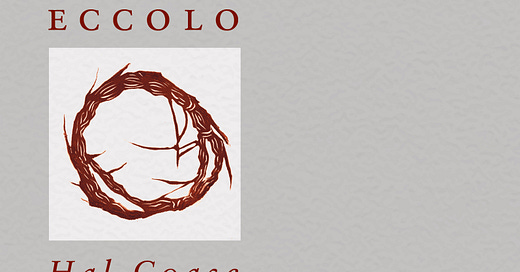‘Poems are no good for hiding in,’ a friend writes, ‘there’s no space to lie down or get comfy.’ This sounds right. Take those spindly poems laid like church stairways, or poems that blast a tunnel through the page (on approach, your brain, that truck, lets out a shiver of worry at the MAX HEIGHT! signage), or sea-view poems, all sharp-edged glass like those infinity pools which fancy the ocean is just another background. I once got stuck in a poem during a blackout. For a while, there was just me and my breath, and then, after an upsetting rattle of gears, the lights came on.
If they’re no good for hiding in, that’s because poems are themselves half-hidden things. Hedgehogs, the moon in the daytime, or a fine boxer’s peek-a-boo. You might learn to hide with them. They might keep you company while you wait to be found or for the game to end once it gets too dark. You are waiting to be found, to be called, and the poem knows something about this. That’s the conspiracy. This is how a poem speaks to us, recognises us, touches us, gets us. Read it, look it up and down, and ask, ‘what is it? What does it want?’ If this goes on long enough (which isn’t long), ‘I turn to myself: “What do I want, wanting to know you?”’1
I don’t mean difficult. Poetry isn’t difficult. Not difficult like squeezing out the last blob of toothpaste, or a conversation with someone you love who you no longer understand. Not that difficult. More often than not, ‘I don’t get it!’ must mean: ‘it doesn’t get me.’ What’s to ‘get’ anyway? Try ‘getting’ a colour, or a tone of voice, or the way a tree grows. Half-hidden in plain sight, always almost reachable and moving away, the poem leads us on without a clue. Barbara Guest called this the poem’s ‘audacity’ (‘How dare you!’ she whispers to the typewriter). María Zambrano puts it like this: ‘It goes where it’s lost.’ Like James Schuyler writing how he’ll never write the poem that he’s writing, or Charlie Chaplin on the circus tightrope, harassed by monkeys and dropping his trousers in mid-air, you could think of poetry as a string of well-executed catastrophes. Not difficult, but being in difficulty. A deferral of the last word on anything. The constant diversion of disaster into truer and more bearable satisfactions. Nothing more than the queer art of fucking up.
I wrote Eccolo in my twenties (which, as a friend once told an other me, ‘are for fucking up’). I don’t mean that I wrote it knowing I was writing it. That would have been slick! Whenever I try writing a book knowing that I’m writing a book, the book that isn’t being written swallows the book I thought I was writing, which has swallowed the book I was, in fact, writing (‘There’s always a bigger fish!’). It would be better to say Eccolo was collected from the last ten years, gathered up from out of what half-hidden curios I had found on the way.
‘Eccolo!’ ‘There it is!’ It’s what you shout in your head when you glimpse the sea from the car window at the end of an August day’s drive, or when you find that book you were looking for (a book which may also now be called Eccolo, if you like), or when you spot your friend in a crowd as they step out towards you. Everything is newly as it was. It’s a little deliverance. A commonplace epiphany. It’s the sound an object makes when it enters a scene. It’s a little childish and pathetic (both good and precious things). It’s about being lost and found.
In the writings of Sandro Penna—a master of finding the lost and then losing what he’s found—the poem has un cuore vago: a vague heart. ‘Vague’ isn’t quite it. In English, the word has the sting of critique. In Italian, it is more gracious, a little closer to its root ‘wandering’: vague not simply because it can’t stay put, but because it opens an elsewhere. Cloud-like and intemperate, alluring, the vague object is distracted by its own excitement:
Ove – ferme le ore
su attoniti quadranti –
ritorna un vago amore
alle cose vaganti.
Where – the hours firm
on an astonished dial –
a vague love returns
to wandering things.
In the astonished interval of the poem, love gets us back off track. Displacement as return, which is more or less how poems do what they do. Go where you’re lost, Penna says. You won’t be alone.
This week's article is by Hal Coase, author of Eccolo: Poems, which is published this month! Remember to use the code JULYBOOKS for 10% off and free UK P&P.
Roland Barthes, A Lover’s Discourse, p.135





